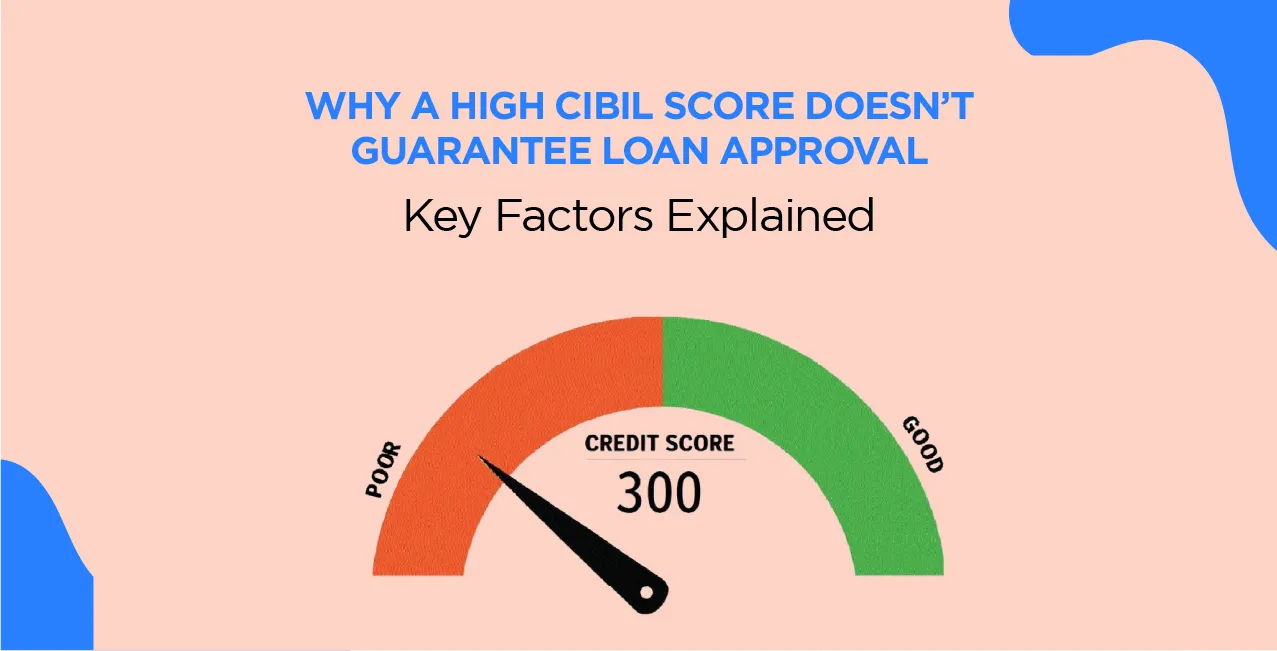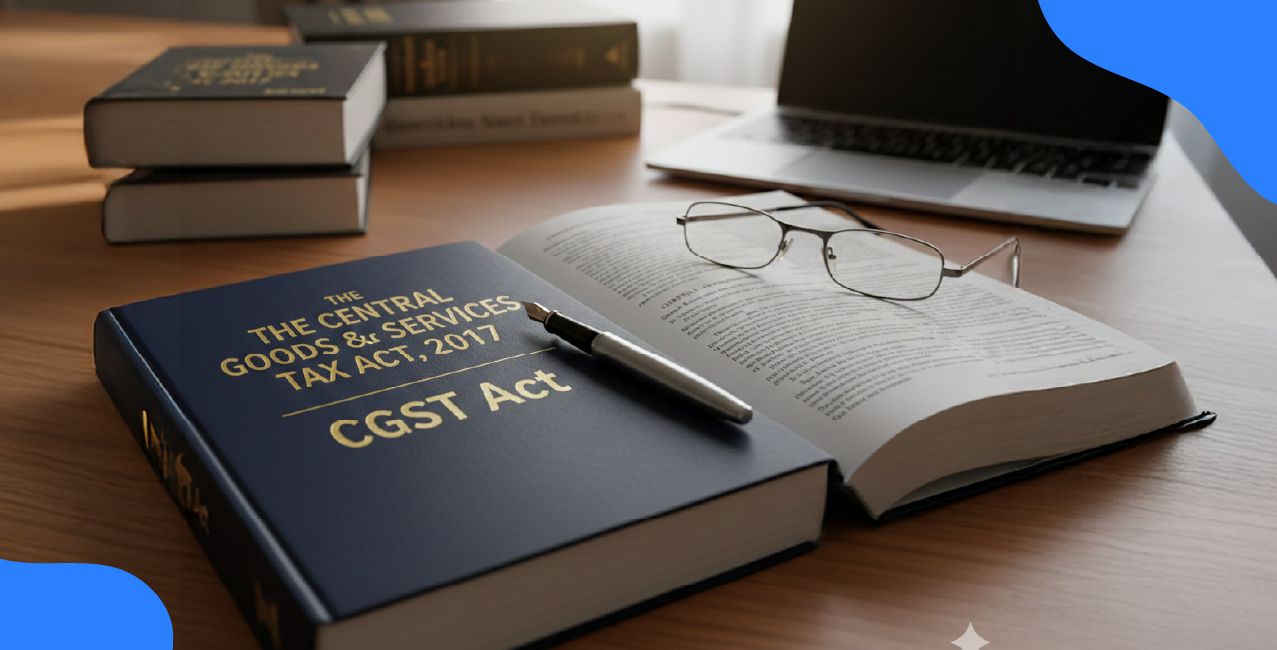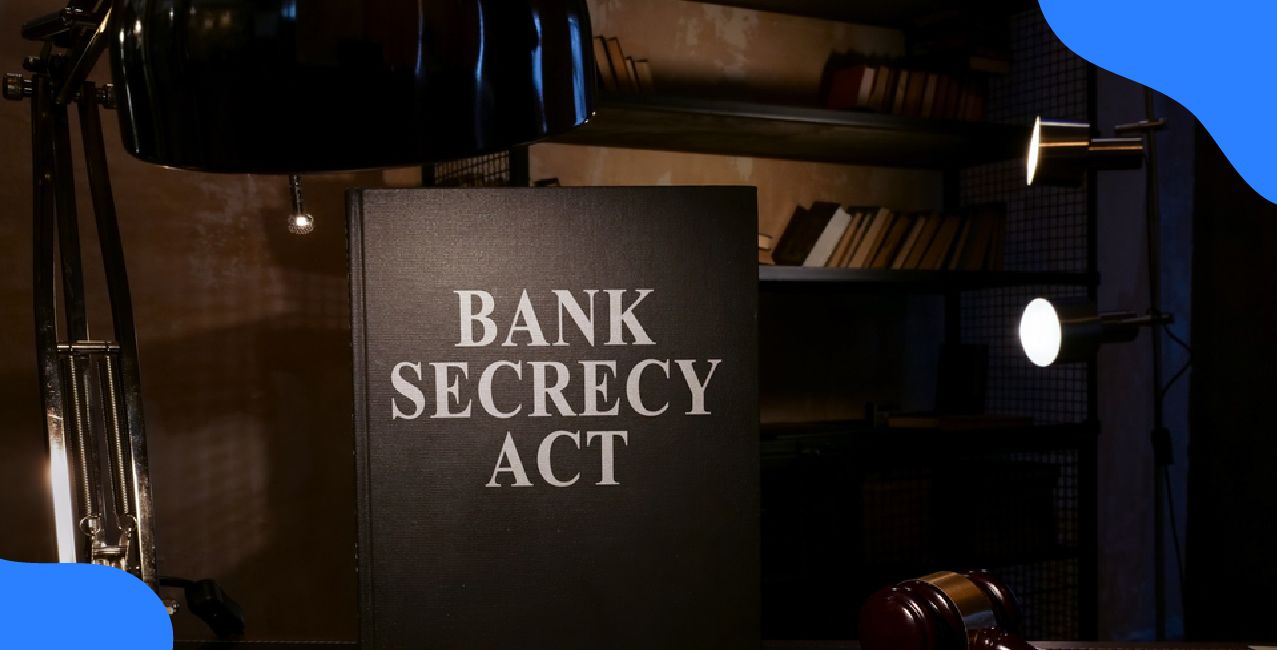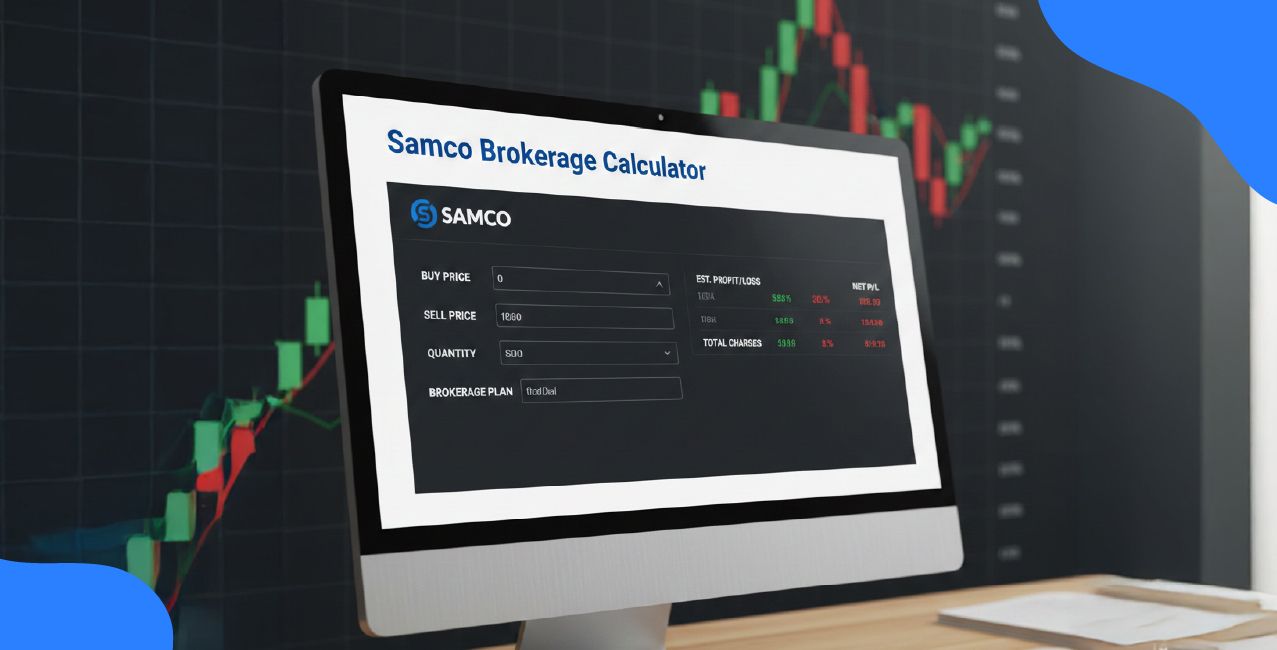Why a High CIBIL Score Doesn’t Guarantee Loan Approval – Key Factors Explained

Check Your Loan Eligibility Now
By continuing, you agree to LoansJagat's Credit Report Terms of Use, Terms and Conditions, Privacy Policy, and authorize contact via Call, SMS, Email, or WhatsApp
Rajesh is an IT professional from Bengaluru who maintained a high CIBIL score of 800. Confident in his creditworthiness, he applied for a personal loan ₹5,00,000.
To his surprise, the application was rejected. This scenario isn't uncommon; in fact, a significant number of loan applications face rejection despite applicants having commendable credit scores
Recent data indicates that small-ticket personal loans under ₹10,000 have experienced higher delinquency rates, especially for loans taken between December 2023 and June 2024.
This surge is primarily attributed to non-banking financial companies (NBFCs) lending outside the top 100 cities, leading to a 44% increase in delinquencies among personal loan borrowers during this period.
Such trends have prompted banks to tighten their lending criteria, resulting in higher rejection rates. For instance, some banks have reported increased loan application rejections from 20-25% to 30-35%, reflecting a more cautious approach in the current economic climate.
Insufficient Income for Loan Repayment
A high CIBIL score shows a good credit history, but banks also check if you have enough income to repay the loan. Let’s say, Priya, a marketing executive from Mumbai, has a CIBIL score of 810.
She applied for a home loan of ₹50,00,000, but the bank rejected it because her monthly salary is only ₹40,000. Even though her credit score is excellent, the bank fears she may struggle to pay the EMI, which would be around ₹50,000 per month.
Lenders have strict income requirements based on the type of loan. For example, a personal loan may require a minimum salary of ₹25,000, while a home loan may need ₹50,000 or more.
Banks also consider your fixed obligations to income ratio (FOIR); if too much of your income is already spent on EMIs, they may reject your loan. This is why a good salary with manageable expenses is just as important as a high credit score.
High Existing Debt Burden
Even if your credit score is high, having multiple loans or credit card dues can make lenders hesitant to approve a new loan. They check if you are already repaying too many EMIs and if another loan will stretch your finances too much.
1. Total EMI Payments Matter
Banks check how much of your monthly income goes into repaying loans. For example, lenders may reject your application if you earn ₹80,000 per month but already pay ₹40,000 in EMIs for other loans. They prefer borrowers whose debt-to-income ratio stays below 40%.
2. High Credit Card Outstanding Dues
Ravi, a software engineer from Pune, pays only the minimum amount on his credit cards every month, leaving a balance of ₹3,00,000.
Even though he never misses payments, banks may reject his loan request because high credit card dues suggest he relies too much on borrowed money.
3. Too Many Active Loans
Multiple ongoing loans, such as a home, car, and personal loan, can lower your loan eligibility. Lenders worry that adding another EMI may lead to repayment issues.
4. Multiple Loan Applications
Applying for too many loans in a short period can signal financial stress. Each application triggers a hard inquiry, which can slightly lower your CIBIL score. More importantly, banks may assume you are struggling financially and reject your loan.
Loan Type and Preferred EMI Limit
Loan Type | Preferred EMI as % of Salary | Example: Monthly Income ₹75,000 |
Personal Loan | Up to 40% | ₹30,000 |
Home Loan | Up to 50% | ₹37,500 |
Car Loan | Up to 30% | ₹22,500 |
Credit Card | Should be fully paid each month | Avoid carrying balance |
Frequent Job Changes or Unstable Employment
Lenders prefer borrowers with stable jobs and steady incomes. If you switch jobs frequently or work on short-term contracts, banks may see you as a high-risk borrower. Even a strong CIBIL score may not help in this case.
- Minimum Job Stability Required: Most banks prefer applicants who have worked in the same job for at least 1-2 years.
- Self-Employed Challenges: If you run your own business, banks may require proof of at least three years of stable income before approving a loan.
- High-Risk Industries: People working in industries with frequent layoffs (like startups) may face tougher loan approval conditions.
- Employment Type Matters: Government employees and professionals like doctors or chartered accountants are considered lower-risk borrowers.
- Probation Period Issues: If you apply for a loan while on probation at a new job, banks may delay or reject your loan until you complete the probation period.
- Freelancers and Consultants: Without regular salary slips, freelancers may find getting loans without strong financial records challenging.
- Salary Credited in Cash: If your salary is not credited to a bank account and is paid in cash, banks may reject your loan application due to a lack of proof of proper income.
Low Credit Mix—Lack of Diverse Credit History
A high CIBIL score shows good credit behaviour, but lenders also look at credit mix—the variety of loans you have handled. If you have only one type of credit, like a credit card, banks may see you as a risky borrower.
Take the example of Sameer, a 30-year-old IT professional from Hyderabad. He has a CIBIL score of 780 but has never taken a loan; only a credit card he pays off every month. The bank rejected him when he applied for a home loan of ₹40,00,000 because he had never managed long-term loans.
Lenders prefer a balanced credit mix—secured loans (home, car) and unsecured loans (credit cards, personal loans). A diverse credit history proves you can handle different types of credit responsibly.
To improve your credit mix, consider taking a small secured loan, like a gold loan or a consumer durable loan, and repaying it on time.
Poor Bank Account Transactions and Low Savings
Banks do not only check your credit score; they also examine your bank statements and savings balance. Your loan application may be rejected if you frequently overdraw your account, have low savings, or show irregular income.
1. Negative Bank Balance or Overdraft Usage
If your salary is ₹50,000 per month, but you keep using an overdraft or have a negative balance at the end of the month, banks may assume you are struggling financially. Lenders prefer applicants who maintain a positive balance and show good money management.
2. Irregular Salary Credits
Rahul, a self-employed consultant from Delhi, applies for a car loan of ₹12,00,000. Though he earns well, his bank balance fluctuates, and sometimes he goes months without deposits. The bank sees this as unstable income and rejects his loan.
To improve approval chances, self-employed applicants should maintain a steady monthly deposit history in their accounts.
3. High Unexplained Cash Deposits
Frequent large cash deposits without proof of income can raise red flags for banks. Lenders may suspect unreported income sources, leading to loan rejection.
For example, the bank may decline their loan if someone deposits ₹2,00,000 in cash every month but shows no business proof.
Preferred Savings Balance for Loan Approval
Loan Type | Recommended Savings | Example: Monthly Income ₹75,000 |
Personal Loan | 3-6 months EMI | ₹90,000 - ₹1,80,000 |
Home Loan | 6 months EMI + Down Payment | ₹3,00,000 - ₹5,00,000 |
Car Loan | 3 months EMI | ₹60,000 - ₹1,00,000 |
Business Loan | 6 months of operating expenses | Varies by business |
Errors in Your Credit Report
Even a tiny mistake in your CIBIL report can lead to a loan rejection. Sometimes, banks may report incorrect details or fail to update settled loans. Here’s how errors can affect your loan application.
1. Wrong Loan Details
Errors in past loan records can make it seem like you have unpaid dues. If you took a personal loan of ₹3,00,000 in 2022 and repaid it entirely, but your report still shows it as active, lenders may reject your new loan request.
2. Incorrect Personal Information
If your name, PAN, or Aadhaar number has errors in your CIBIL report, banks may not be able to verify your identity. This can delay or reject your loan application. Always check for misspelt names or wrong address details in your credit report.
3. Loans Not Taken by You (Fraudulent Loans)
Imagine Priya, a software engineer in Mumbai, applying for a home loan of ₹35,00,000. She is shocked to see a personal loan of ₹2,50,000 in her CIBIL report, which she never took. This is a case of identity theft, where someone misused her details. If this happens, report it to CIBIL and the bank immediately.
Common Credit Report Errors and Their Impact
Error Type | Possible Issue | How It Affects Loan Approval |
Wrong Loan Status | Paid loan showing as unpaid | Lenders think you have pending debt |
Incorrect Personal Info | PAN/Aadhaar mismatch | Loan verification failure |
Fraudulent Loan | Loan taken by someone else | Identity theft risk |
Unreported Repayments | Settled dues not updated | Affects CIBIL score |
Old Credit Limits | Low credit limit shown | High credit usage warning |
To avoid loan rejection due to credit report errors, check your CIBIL report every 3-6 months and dispute any mistakes with CIBIL immediately.
Not Meeting the Lender’s Internal Policies
Banks and NBFCs have their approval policies, which can vary. Even if your CIBIL score is high, you may not qualify for a loan because of lender-specific rules.
- Minimum Salary Requirement: Some banks require a minimum income of ₹30,000 per month for a personal loan, while others may approve loans for salaries as low as ₹20,000. If you do not meet their requirement, they will reject your application.
- Location-Specific Approval Rules: Some lenders do not approve loans for specific areas or cities. If you apply from a location outside their coverage, your loan may be declined.
- High-Risk Job Profiles: If you work in a startup, commission-based job, or seasonal business, lenders may see you as a risky borrower.
- Company Profile Matters: Banks are more likely to approve your loan if you work for a reputed company (like TCS or Infosys). If your company is a small startup, lenders may hesitate.
Comparison of Different Bank Loan Policies
Bank/NBFC | Minimum Salary for Personal Loan | CIBIL Score Required | Loan Amount Limit |
HDFC Bank | ₹25,000 per month | 750+ | Up to ₹40,00,000 |
SBI | ₹30,000 per month | 750+ | Up to ₹20,00,000 |
ICICI Bank | ₹25,000 per month | 750+ | Up to ₹30,00,000 |
Bajaj Finserv | ₹20,000 per month | 720+ | Up to ₹25,00,000 |
Axis Bank | ₹30,000 per month | 750+ | Up to ₹25,00,000 |
Before applying, always check the lender’s eligibility criteria and ensure you meet their salary, job, and location requirements.
Conclusion
A high CIBIL score is essential but does not guarantee loan approval. Banks consider income stability, employment history, debt burden, savings balance, and internal policies before approving a loan.
Even minor issues like errors in your credit report or applying for too many loans can lead to rejection.
To increase your chances of approval, maintain a balanced credit mix, steady income, low debt-to-income ratio, and updated credit records. Always check lender-specific eligibility criteria before applying.
FAQs
1. Why was my loan rejected despite having a high CIBIL score?
A high CIBIL score is just one factor. Banks also check your income, employment stability, debt-to-income ratio, and bank transaction history. If you have a low salary, high debts, or unstable job, your loan may be rejected.
2. How often should I check my CIBIL report for errors?
You should check your CIBIL report every 3-6 months. This helps you spot and correct any errors, fraudulent loans, or outdated loan statuses before applying for a new loan.
3. Can too many loan applications lower my credit score?
Yes, applying for multiple loans in a short time triggers hard inquiries, reducing your CIBIL score by 5-10 points per inquiry. Lenders may also see this as a sign of financial distress and reject your application.
4. What is a good debt-to-income ratio for loan approval?
Banks prefer a debt-to-income ratio below 40%. This means if your monthly income is ₹75,000, your total EMI payments should not exceed ₹30,000. Higher debt ratios may lead to loan rejection.
Other Informative Pages | |||
Should You Close Old Credit Cards to Improve Your Credit Score | |||
About the author

LoansJagat Team
Contributor‘Simplify Finance for Everyone.’ This is the common goal of our team, as we try to explain any topic with relatable examples. From personal to business finance, managing EMIs to becoming debt-free, we do extensive research on each and every parameter, so you don’t have to. Scroll up and have a look at what 15+ years of experience in the BFSI sector looks like.
Subscribe Now
Related Blog Post
Recent Blogs
All Topics
Contents
Quick Apply Loan
Consolidate your debts into one easy EMI.
Takes less than 2 minutes. No paperwork.
10 Lakhs+
Trusted Customers
2000 Cr+
Loans Disbursed
4.7/5
Google Reviews
20+
Banks & NBFCs Offers
Other services mentioned in this article








